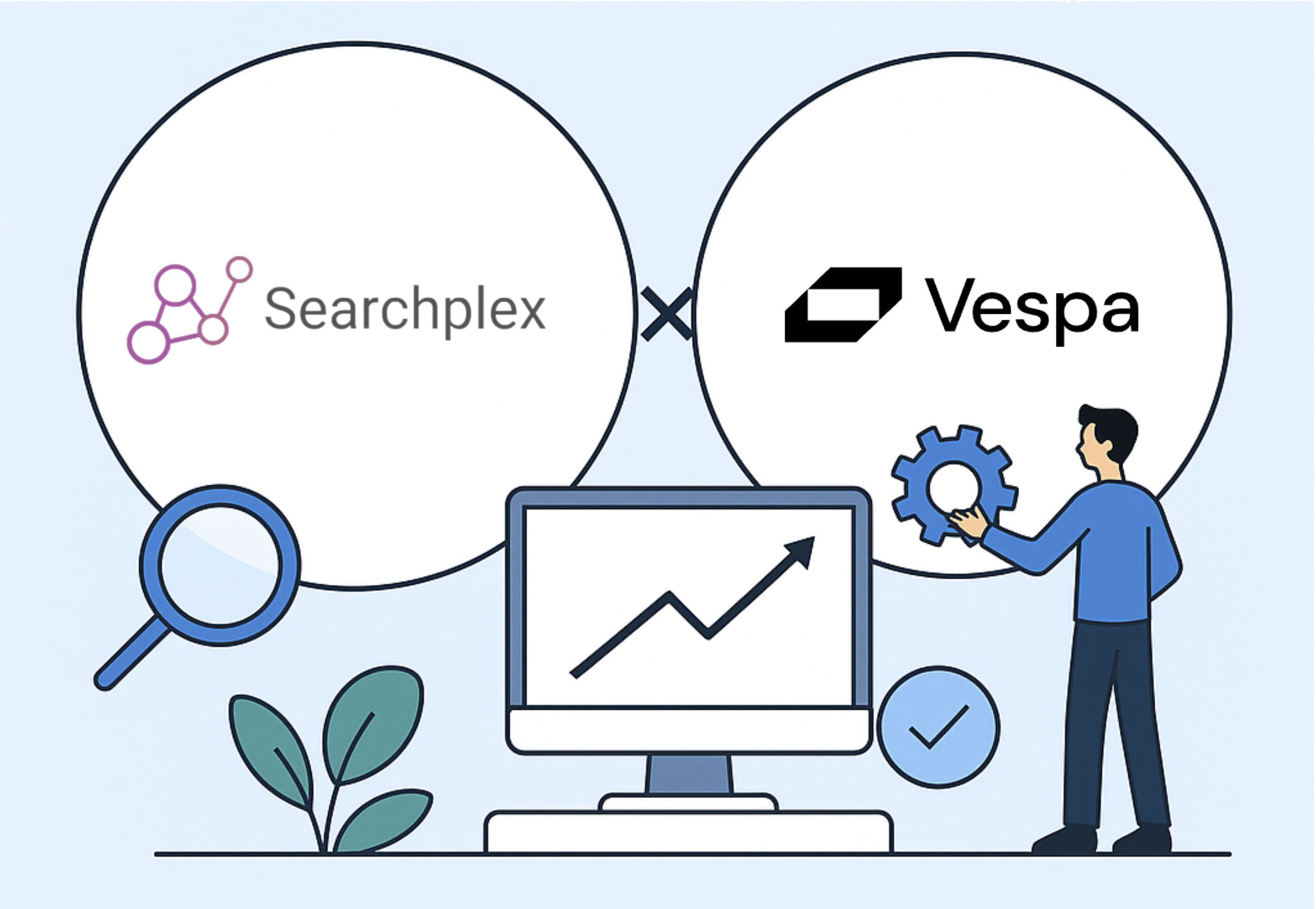Powering the Next Era of Personalised Commerce
E-commerce has entered a new age. Shoppers expect more than just good search results—they expect personalized, dynamic, and trustworthy experiences tailored to their unique needs. Businesses, meanwhile, face the daunting challenge of balancing personalisation, business objectives, system costs, and innovation speed—while ensuring everything works reliably at scale.
That’s where Vespa comes in. Often described as a sleeping giant in the world of search and recommendation technology, Vespa was delivering vector-based search and real-time recommendations long before the hype. Today, it’s a battle-tested platform used by global leaders across retail, media, finance, and beyond to solve the toughest problems in personalisation and discovery.
The Challenges Facing Modern Commerce
Personalisation at Scale
Every user deserves a personalized experience. But personalisation isn’t just a “nice-to-have”—it’s a necessity. Preferences differ not only from user to user, but also across context: location, time, popularity, rating, pricing, seasonality, or even the user’s current mood. Systems need to adapt instantly, making personalisation both real-time and deeply contextual.
Business Objectives in Motion
E-commerce platforms juggle multiple—and sometimes conflicting—objectives. Localisation, vendor strategies, individual product strategy, stock levels, seasonal shifts, and profit margins all demand attention. And because the market changes dynamically, strategies must adapt in real time. A user’s click shouldn’t just trigger a static result—it should adjust the business’s strategy on the fly. Business strategies should be as dynamic as results.
Innovation Speed
Innovation cycles have collapsed. What was once a driver for higher scalability, the movement into microservice architecture, separate search, ranking, catalog, recommendation/personalisation, and ads service, is now becoming a bottleneck for low latency advanced use cases, and significantly decreasing innovation speed. Teams don’t have months or years to roll out new features; they need the ability to experiment hourly. What once required a major project must now become a daily test, easily evaluated, rolled back, or scaled up. Imagine experimenting with personalised video feeds in a shopping app—that’s the sort of innovation pace companies must enable.
Collaboration Across Teams
Search, Recommender Systems, AdTech, and Data Science teams all need to work together without stepping on each other’s toes. Collaboration should be seamless: adding a new feature shouldn’t require another system, another migration, or risky rewrites. Instead, configuration changes and safe experimentation should power evolution, not revolution.
Real-Time Measurement and Control
Business logic should incorporate behavioural metrics directly, without latency penalties. The same metrics that drive user personalisation should also drive observability and decision-making. Otherwise, you risk a slow, laggy system that can’t react to user signals in the moment.
The Cost–Latency Trade-off
Distributed systems often burn money and time by shuffling huge amounts of data across services for every interaction. This trade-off between cost, functionality, and latency has plagued e-commerce for decades. Businesses need a way to keep data close to where it’s used, without blowing up budgets.
Vespa’s Answer
Vespa was purpose-built to address these challenges, combining a search engine, feature store, recommender platform, and ML inference engine in one powerful system.
-
Best-in-class search – Vespa excels at both lexical and semantic search, consistently outperforming alternatives in speed and scalability. It also supports GeoSearch as retrieval filtering and ranking parameters. Because of this GeoSearch, businesses can serve their customers with relevant, ranked and precise location information based on personalized distance tolerations. This enhances the user experience beyond any of today’s traditional search solutions.
-
Built in flexible Ranking - With Vespa your data doesn’t need to be sent to a separate ranking system. This leads to major advantages: significantly lower latency, lower network traffic, unified shared data, higher reliability and significantly lower cost. An extraordinarily rich ranking system lets you combine unlimited functions, letting you focus not just on retrieval quality but also user preferences, personalisation and at the same time responses tailored to business objectives. Vespa can use any signal to create tailored, multistage ranking expressions, or rank profiles. This is the key to multi-objective optimisation in production, from revenue and margin to fairness and user satisfaction, keeping system performance in mind.
Vespa supports multiple ranking profiles with profile inheritance, and ranking profiles can be chosen at query time. This gives businesses flexibility by offering for example freedom for stores in other countries/cities to run their own campaigns or business strategy but still profiting from Global ranking, personalization and profiling.
-
Computation at scale - Vespa’s tensor framework is unique. Tensors serve as a universal data representation for embeddings, metrics, counters, and personalisation signals, enabling real-time highly efficient calculations at query time. Used in ranking expressions enable to build personalisation service, learning from behaviour, business control ( price elasticity, margin, stock, campaign boosts, brand rules - mathematically combined with relevance.) This enables businesses to have a highly tailored and personalized experience for their customers.
-
ML models as first-class citizens – Vespa supports deploying and running a wide range of ML models (ONNX runtime) directly inside ranking, on both CPU and GPU, eliminating the costly round-trips to external inference systems.
Trained small models like GBDT( such as XGBoost and LightGBM) simplify ranking logic - replace hand crafted expressions with ML learned logic. Models can be trained on real user interaction data, statistics, locations and greatly improve ranking results for company and customer benefit. For example AdServing applications, which operate on very thin profit margins, highly benefit from high speed inference combined with further ranking expressions to tailor responses.
-
Real-time updates – Unlike most search solutions, Vespa supports granular updates, down to individual tensor cells. It can serve as your live feature store, basket, inventory, and catalogue simultaneously. Not only keeping updated values but also letting ranking algorithms access it instantly without passing it through the network and adding more latency and cost.
-
References across documents (more than Parent/Child relationships) – Vespa handles relations between documents natively, imagine that you can set multilevel relationships but access documents fields in any level. For example in children you can treat parent fields or even grand parent fields as local, allowing immediate access to linked documents fields during children ranking ( no additional retrieval needed! ). That means global metrics, taxonomies, and counters can flow directly into query-time decisions. Making your vespa feature store even more powerful.
Use Cases Vespa Unlocks
-
Search & Discovery Excellence: Advanced query understanding, multimodal ranking (text, image, video), and real-time freshness or other metrics like CTR,CVR,GP blending.
-
Recommendations & Personalisation: Cold-start handling, session-aware behaviour modelling, balancing novelty with relevance, and consent-aware personalisation.
-
Business Objective Optimisation: Multi-objective ranking (GMV, profit margin, SLA risk, inventory levels), promo elasticity, and unifying ads, search, and recommendations in a way that doesn’t degrade user experience.
-
Innovation at Speed: Config-driven experimentation, A/B testing, counterfactual evaluation, safe rollouts with observability.
-
Collaboration at Scale: Shared metrics, development environments, clear ownership across teams.
-
Catalogue Data Quality: Normalisation, deduplication, attribute extraction, counterfeit detection, and policy enforcement.
-
Performance & Reliability: Black Friday readiness, autoscaling, real-time observability, and efficient resource use.
Analysts and Customer Perspectives
Industry analysts are starting to recognise Vespa’s unique position. In recent Gartner and Forrester reports, real-time vector search and personalisation platforms are highlighted as critical enablers of next-gen digital commerce.
Customers—including some of the world’s largest retailers, media platforms, and financial institutions—already run Vespa in production at massive scale, serving billions of queries daily. They choose Vespa not just for performance, but because it enables them to move faster, innovate continuously, and meet user expectations without compromise.
The Vision Ahead
E-commerce is no longer just about search bars and product listings. It’s about dynamic, personalised journeys that adapt to each user in real time, while optimising for business outcomes. With Vespa, businesses don’t have to choose between personalisation, innovation, or cost efficiency—they can have it all.
Vespa isn’t just a database. It’s the platform for the future of personalized commerce.
Call For Action
Vespa has helped many businesses around the globe to migrate from their existing environment to the future of eCommerce. If you are interested in entering the future of eCommerce please contact us.


